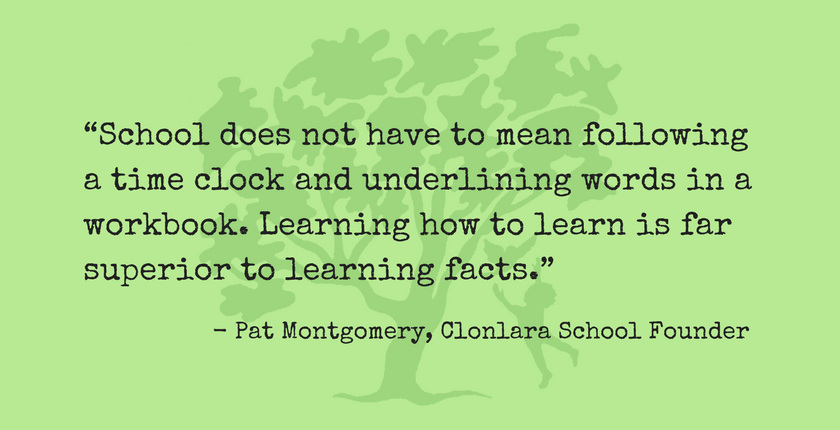By Pat Montgomery, Founder
Editor’s Note: From time to time, we’ll “look back” through our archives to share articles that are as relevant today as when they were printed. In this piece that was originally published in the January 1999 issue of The Learning Edge, Clonlara’s founder discusses the power of letting students’ interests, not textbooks, guide the learning process.
Most people think of textbooks and workbooks and sitting at desks when they think of school. At Clonlara campus school, we have no desks, per se. We have tables, chairs, big pillows and rugs on the floor, lofts, and cubbyholes—all of which can be used as desks. Not too unlike a home.
We do not use textbooks as a routine practice. There are plenty available, but none are automatically assigned. These serve more as reference books than as texts in the traditional school sense.
When people think of school, they usually think of subjects like reading, spelling, math, etc., all divided up into time slots with recess and lunch break thrown in. At Clonlara, we accentuate the indivisibility of subject areas. Math includes reading, science includes math and reading, and the like. Overlap is the name of the game. Only in schools are things to learn divided into time segments. The reason for this? Control. When hundreds, even thousands of kids are assembled—many against their will—in one place for a defined period of each day, the control mechanisms are a must, make no doubt about it.
This description has nothing whatsoever to do with education. It has only to do with schooling. Home-based education is a thing apart. It need not resemble conventional school in any way, shape, or form—unless a student and parent determine between them that it should.
Take, for example, the change of seasons. If a student shows interest (and almost anyone will when these matters are approached honestly, naturally…not from a textbook angle) in the arrival of fall, that TOPIC becomes the focus of activities (the “lesson”): experiencing the out-of-doors, observing, enjoying, watching, walking, talking, whispering, reading, recording, keeping track of events. This involves every single school subject: reading, counting, charting, drawing, etc. More than that, it involves thinking and creating rather than swallowing facts and regurgitating them on command.
School does not have to mean following a time clock and underlining words in a workbook. Learning how to learn is far superior to learning facts. Learning through actual involvement sparks interest.
In short, the child is the curriculum. That is why we recommend using our own or any other curriculum as a working paper. Youngsters may eat, sleep, walk, talk dinosaurs for weeks or months on end. That’s the real essence of interest-fed learning. When a child is free to pursue such routes, she learns much more than the topic at hand. Visit museums, draw, color, make up stories, write them down. This is learning. It is real, uncoached stuff.
Ah, but the student will “fall behind” his schooled cousin, you might worry. In the short run, yes. He may not be able to recite the same facts. In the long run, however, lies the reward. He learns how to trust himself and his own instincts. He learns the scientific method of inquiry without even realizing that he’s practicing it. He uses his brain as a processor, not just his ears or his hand or his mouth.
I think this is what Mark Twain meant by saying that he never let school interfere with his education.
What ideas do you have for turning students’ interests into the focus of their learning activities? Share your examples and advice for others below.








One Response
It is always interesting to get back to 1999 and reflect on what learning to learn may still be nowadays, in the 21st century, ln a way long after Twain provoked us by excluding school out of his certainly schooled rigorous education.
In a way we all ow a lot to woodstocking life I’ll always admire for the genuine sense of iconoclasty bourgeois happily could afford even if I still cannot. The fact is throwing time clock education away to replace chairs by pillows has been creating disorganized children and youngsters who are now aware of how useful it is to overcome their parents’ education (or self chaos for a generous mythology of a family succeeding by destroying grandparents’ rules with their money still miraculously paying for what went wrong in a classical way). I’d like to agree Fall interests for observation, even for contemplation (most of them would fall asleep if they had not taken discipline out of their disciplined grandma education to have taken care of them while their parents were struggling for some kind of privileged freedom: yes, these are privileged ones.), are great and will replace the so called conventional school for controlling (And what is it not to control by the way?)
My students sit on chairs, obey to time, may have no clocks if they submit to them, not only keep quiet but have to be elegant. When they are, I will allow them to eat in the classroom while we are studying Marine Le Pen’s answer to awful Diam’s Marine Song because they had a too long seminar before mine and not only could not eat, they would never be late and would be starving and beautiful not to disappoint me. The first thing I learned from Libertine authors is that one has to assume the system to destroy it in the sense we may destroy it to keep it intact with a soul inside for those who have one. My students have a soul, each one has a soul, their teacher has not, as they Know and keep on sharing theirs with me. They are thus charitable and my reward is to provide them with discipline to transgress by learning sitting for hours with no landscape beyond their spirit to be designed by sacrifice and its pleasure. Life controls us, we need to afford life and if it excludes us, we’ll be no curriculum at all. Rich people will always pay for illusional curricula but a curriculum is hard work, long nights to exercise algebra and metrics and linguistics and geometry.
Now my students offer me a pillow. But when I look at them, I see no more their chairs. They sit on thrones. They have suffered.